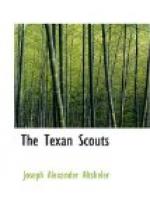They came at last to a bit of woodland growing about a spring that seemed to gush straight up from the earth. It was really an open grove with no underbrush, a splendid place for a camp. It was evident that Cos’s force had put it to full use, as the earth nearly everywhere had been trodden by hundreds of feet, and the charred pieces of wood were innumerable. The Panther made a long and critical examination of everything.
“I’m thinkin’,” he said, “that Cos stayed here three or four days. All the signs p’int that way. He was bound by the terms we gave him at San Antonio to go an’ not fight ag’in, but he’s shorely takin’ his time about it. Look at these bones, will you? Now, Ned, you promisin’ scout an’ skirmisher, tell me what they are.”
“Buffalo bones,” replied Ned promptly.
“Right you are,” replied the Panther, “an’ when Cos left San Antonio he wasn’t taking any buffaloes along with him to kill fur meat. They staid here so long that the hunters had time to go out an’ shoot game.”
“A long lane’s the thief of time,” said Obed, “and having a big march before him, Cos has concluded to walk instead of run.”
“‘Cause he was expectin’ somethin’ that would stop him,” said the Panther angrily. “I hate liars an’ traitors. Well, we’ll soon see.”
Their curiosity became so great that they rode at a swift trot on the great south trail, and not ten miles further they came upon the unmistakable evidences of another big camp that had lasted long.
“Slower an’ slower,” muttered the Panther. “They must have met a messenger. Wa’al, it’s fur us to go slow now, too.”
But he said aloud:
“Boys, it ain’t more’n twenty miles now to the Rio Grande, an’ we can hit it by dark. But I’m thinkin’ that we’d better be mighty keerful now as we go on.”
“I suppose it’s because Mexican scouts and skirmishers may be watching,” said Ned.
“Yes, an’ ‘specially that fellow Urrea. His uncle bein’ one of Santa Anna’s leadin’ gen’rals, he’s likely to have freer rein, an’, as we know, he’s clever an’ active. I’d hate to fall into his hands again.”
They rode more slowly, and three pairs of eyes continually searched the plain for an enemy. Ned’s sight was uncommonly acute, and Obed and the Panther frequently appealed to him as a last resort. It flattered his pride and he strove to justify it.
Their pace became slower and slower, and presently the early twilight of winter was coming. A cold wind moaned, but the desolate plain was broken here and there by clumps of trees. At the suggestion of the Panther they rode to one of these and halted under cover of the timber.
“The river can’t be much more than a mile ahead,” said the Panther, “an’ we might run into the Mexicans any minute. We’re sheltered here, an’ we’d better wait a while. Then I think we can do more stalkin’.”
Obed and Ned were not at all averse, and dismounting they stretched themselves, easing their muscles. Old Jack hunted grass and, finding none, rubbed Ned’s elbow with his nose suggestively.




